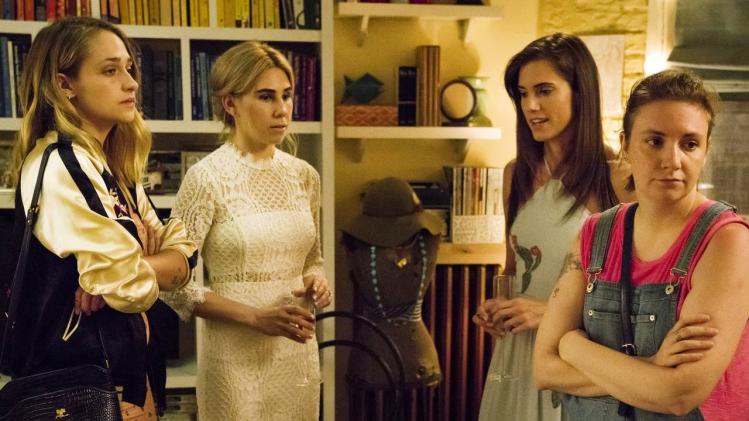
Good art should help us to find beauty, truth, and light. In Lena Dunham’s breakout HBO series Girls, the world is devoid of beauty and light but it is filled with truth. Over the course of six seasons (the series ended this spring), we watch and follow Hannah Horvath, an aspiring writer, navigate her twenty-somethings through contemporary Brooklyn. She and her squad of friends struggle: In and out of jobs, romances, and friendships, they self-destruct through greed, vanity, envy, gluttony, and sloth but most of all through pure, unadulterated narcissism.
So why bother watching? Why should we care? In a series lacking redemption, should we stick around to witness truth?
Reluctantly, yes. To be frank, I don’t like these girls. But in their shrewd sense of egoism there is a captivating reality, a reality that maybe only a twenty-something privileged white woman from New York could capture. Commuting into Commonweal this summer, I’ve grown to realize how expertly Dunham cuts to the core of one of New York’s principal character traits: self-importance. A special brand of narcissism is front and center in this city. Here in the capital of the world, the center of the universe, we all walk around knowing that we matter. At Our Lady of Peace School, my first-grade teacher Sr. Jean taught me that God made each and every one of us individually, and loves us all as if we were the only ones in the world. In New York, you don’t need to look far for evidence of this radical sense of human dignity. Through well-crafted, humorous storytelling Dunham finds a way to make this captivating. Vulgar and crass, sometimes even cringe-worthy, the trials and tribulations of her millennials are worth watching.
The series, more often than not bogged down by its distasteful storylines and attempts to force dialogue, is propped up by the strength of its acting. Dunham unapologetically portrays her unlikable protagonist with the confidence of a seasoned actress, embracing her body as a vessel for storytelling through physicality. Adam Driver’s breakout performance as Adam Sackler, Hannah’s long-term love interest, earned him three consecutive Primetime Emmy Award nominations. Becky Ann Baker shows her expertise as an Apatow veteran, bringing life to the recurring character of Loreen, Hannah’s mother. The show has succeeded in creating conversations about millennialism, gender, and famously, body image. Yet it failed to evidence fruitful dialogue about other aspects of identity, especially class and race, prompting many writers to pen grievances. The New York City found in Girls is a bastion of white privilege, but how could it not be? Dunham writes about the Brooklyn that she knows.
HBO took a chance on Dunham, giving her a platform when she was only twenty-four years old. We can’t expect Dunham’s Girls to speak for all: instead we should look at it as an intimate self-portrait of a young, privileged, white woman. To address the issue of diversity we don’t need one portrait that represents all of us, we simply need more portraits. Thankfully we are finally seeing this begin to come to fruition. Issa Rae’s Insecure, Aziz Ansari’s Master of None, and Donald Glover’s Atlanta masterfully present to us a variety of lived human experiences.
Greg Boyle SJ, founder of Homeboy Industries, is famous for asking us to seek a compassion that can “stand in awe at what the poor have to carry, rather than stand in judgment at how they carry it.” Dunham’s girls are human: sinful and remarkably poor in spirit. She offers us the opportunity to stand in awe at how they deal with their human frailty. Precisely because of their undeniable flaws, they deserve watching, even now, six years after we were introduced to them.